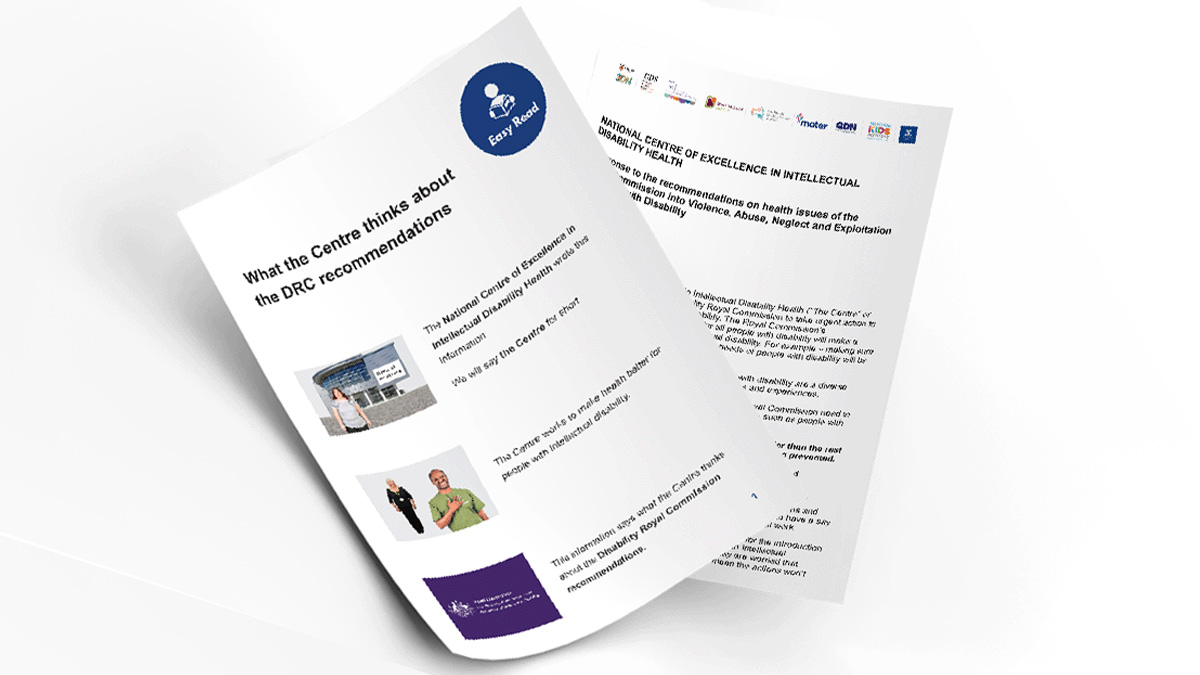Download an Easy Read version of this news item
The National Centre of Excellence in Intellectual Disability Health is very disappointed by the responses of governments around Australia to the health recommendations in the report of the Disability Royal Commission (DRC). We are particularly disappointed by the Australian Government’s response in view of its national leadership responsibility.
The Australian Government has put out its own response and a very similar joint response from itself and State and Territory Governments. State and Territory Governments have also made individual responses. See all responses.
The Australian research evidence shows striking health inequalities facing people with intellectual disability including 38% of deaths being potentially avoidable, around four times the rate of potentially avoidable hospitalisations and people with intellectual disability dying 27 years earlier compared to the general population.
Over the last five years, there have been significant actions taken by the Australian Government to address this situation, including funding the National Centre itself. Some State and Territory Governments have also taken significant actions.
The DRC’s finding of “systemic neglect in the Australian healthcare system” of people with cognitive disability demands an urgent and strong response by the Australian, State and Territory governments. Disappointingly, the governments’ responses to DRC recommendations are predominantly to “accept in principle” the recommendations rather than spell out immediate concrete action.
For example, there is only “acceptance in principle” to list and fund the adaptations and supports that people with disability need in health settings and to better include people with disability in national health agreements such as the National Health Reform Agreement.
One key issue is the implementation of the Intellectual Disability Health Capability Framework (the Framework) which was released by the Australian Government this year. The Centre is please that the Australian Government has shown openness to our argument that implementation of the Framework should not be delayed by broadening it to cover people with other cognitive disability. Rather, the implementation of the Framework could serve as a pathway to further development of cognitive disability health training. On the other hand, the Australian Government has only expressed lukewarm commitment to action to ensure that universities and professional accreditation bodies implement the framework.
Implementation of the framework is both challenging and vital. People with intellectual disability need the strongest national leadership from the Australian Government on this task.
The National Centre applauds that all governments have accepted outright a recommendation to embed the right of people with disability to good health care in key policies and legislation. However, time will tell what this means in practice. Over time, we are too used to seeing general statements about health equity for people with disability lacking detail and mechanisms to promote compliance.
Some of the governments’ responses are particularly disappointing, for example failing to commit to action on a recommendation to outlaw non-therapeutic sterilisation of people with disability, and a guarded response to recommendations to establish a First Nations Disability Forum and disability-inclusive cultural safety standards.
The National Centre does welcome that the Australian Government has ruled out broadening the scope of the Centre to cover health of people with all kinds of cognitive disability. While there certainly is a need for more specialised focus on the needs of other groups, the Centre would lose its sharp focus if its responsibility was broadened.
State and Territory Governments have responded individually to recommendations to establish statewide networks of cognitive disability health teams and disability death review schemes. (The Centre has argued the need for specialised teams specifically focused on people with intellectual disability, in accordance with the existing model in NSW.)
Overall, the State and Territory responses to these recommendations are disappointing.
NSW is the current leader in intellectual disability health teams with teams in seven of its fifteen local health districts and two statewide intellectual disability mental health hubs. The teams are currently being evaluated with a view to considering further enhancements.
The responses from other States and Territories on health teams has varied with some accepting the recommendation in principle and others saying it is “subject to further consideration”. None of these governments has given any clear assurance to implement the recommendation.
On establishing a disability deaths review scheme, governments have acknowledged the benefits of these schemes, but none have said more than “accept in principle” in relation to establishing them.
While the Centre is disappointed with the immediacy of the governments’ responses, there is scope for the governments to move from “accept in principle” response to strong and fast action. The Centre is keen to work with governments on this, and will actively seek opportunities to do so.
Find out more
- Final report of the Disability Royal Commission
- The Centre’s response to the DRC report
- The government responses to the Disability Royal Commission
- Our statement on the government response to the DRC in plain English or Easy Read


